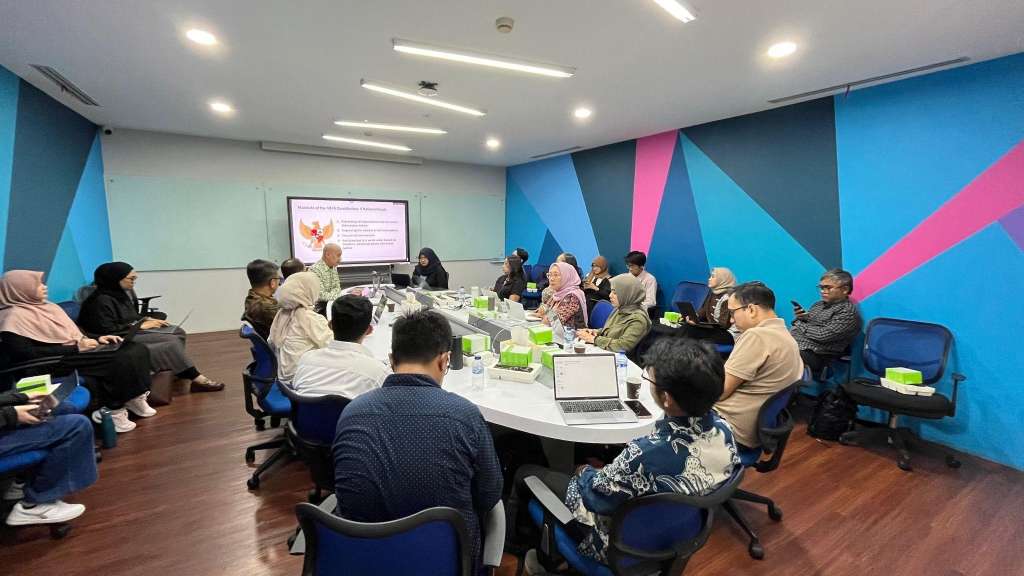Jakarta, September 12, 2024 – The Coalition of Civil Society for Just Energy Transition has submitted eight quick-win recommendations for the first 100 days of the Prabowo-Gibran administration. These recommendations aim to support the goal of achieving higher quality and inclusive economic growth through the accelerateon of energy transition for a green economy, enhancing community welfare and environmental sustainability, in line with Prabowo-Gibran’s vision in Asta Cita.
During a discussion facilitated by Katadata Insight Center (KIC) alongside the Prabowo-Gibran 8% Growth Team, the Coalition of Civil Society for Just Energy Transition emphasized on the importance of energy policies that prioritize renewable energy over new energy sources such as nuclear, coal downstreaming, carbon capture technologies (CCS/CCUS), and natural gas, which are high in emissions and costly. Therefore, there is a need to evaluate energy sector policies, including the National Energy Policy and the Draft Law on New and Renewable Energy.

“Energy transition has the potential to create over a million green jobs by 2050, while also driving more inclusive and environmentally friendly economic growth,” said Indra Sari Wardani, Acting Director of Koaksi Indonesia. “This can also contribute to improving community economies and promoting a broader green economy.”
Secondly, the new president must quickly formulate a roadmap for the early retirement of coal-fired power plants (PLTU) and prepare a safety net, as a follow-up to Presidential Regulation No. 112 of 2022. Agung Budiono, Executive Director of CERAH, revealed that the sooner the early retirement of PLTU is implemented and replaced with renewable energy, the greater the economic benefits for Indonesia.
“Research findings from Celios and CERAH indicate that the economic impact of early retirement at PLTU Cirebon-1, PLYU Pelabuhan Ratu, and PLTU Suralaya is projected to affect gross domestic product (GDP) with an increase of up to IDR 82.6 trillion,” Agung stated.
“In the context of PLTU early retirement, it is also important to highlight the direct impact on vulnerable communities, especially workers, informal groups, and communities dependent on this sector. Social protection policies, training programs, and the creation of new local jobs must be integral to the transition, so as not to worsen the welfare of the most affected communities,” added Tunggal Pawestri, Executive Director of Humanis Foundation.
Thirdly, financing incentives are needed for the shift to renewable energy, as well as the empowerment and improved access to financing for SMEs and cooperatives for community-based renewable energy development. These measures for convenience are expected to foster energy independence at the community level, anticipating future energy needs.
Fourth, environmental, social, and governance (ESG) aspects need to be requirements for obtaining investment permits. “Without strong safeguards, renewable energy development could have significant consequences for the environment and local communities. Moreover, global financial institutions are increasingly strict about ESG aspects when providing project financing,” said Irfan Bakhtiar, Climate and Market Transformation Director at WWF-Indonesia Foundation.
Policy Program Evaluation
The Coalition of Civil Society for Just Energy Transition also highlighted the need to evaluate existing programs from the era of President Joko Widodo. The newly elected president should reassess the biofuel program, specifically the biodiesel blend of 50% (B50) and bioethanol of 10% (E10), as well as the co-firing biomass program at coal-fired power plants. Both programs must consider social justice, environmental carrying capacity, and domestic industry competitiveness.
Nadia Hadad, Director of the Madani Berkelanjutan Foundation, explained that the B50 program needs re-evaluation because studies show that environmental carrying capacity is already at critical limits. This means that new land clearing for oil palm plantations, which are the raw material for biodiesel, must be halted.
Anggi Prayoga, Campaigner at Forest Watch, added that co-firing practices would actually extend the lifespan of coal-fired power plants and encourage the expansion of forest clearing to meet biomass production targets through Energy Plantations (HTE). As a result, Indonesia would bear the burden of increased emissions. According to him, the energy transition should be carried out without harming forests.
Another policy needing evaluation is related to carbon economic value (NEK). The new president must ensure that NEK policies have strong safeguards and can support the achievement of carbon neutrality targets while promoting transparency and accountability in their implementation. This is necessary to ensure that decarbonization in the industrial sector can be achieved promptly and that carbon funds are allocated to green sectors for a green economy.
“Mapping is needed to strengthen regulations and oversight of the implementation of NEK safeguards, including mandatory ones like environmental impact assessments (Amdal) and permit instruments to avoid social and environmental risks from NEK implementation by corporations, and to enhance transparency and accountability in NEK execution,” said Raynaldo G. Sembiring, Executive Director of the Indonesian Center for Environmental Law.
Implementing a just energy transition can be achieved through community participation. “There needs to be meaningful active engagement from the community in energy policy development to create responsive policies that meet local needs and effective implementation. The energy transition is expected not only to support economic targets but also to create a more sustainable and equitable future for all Indonesians,” concluded Bhima Yudhistira, Executive Director of Celios.
***
Media Contacts:
- Indra Sari Wardhani, Plt. Program Director Koaksi Indonesia, 0811-1847-095
- Sandra Winarsa, Energy and Climate Advisor, Yayasan Humanis, 0812-9133-062
- Chrisandini, Energy Project Leader, WWF Indonesia, 0815-8019-797
The Press Release can be downloaded at the link below:



